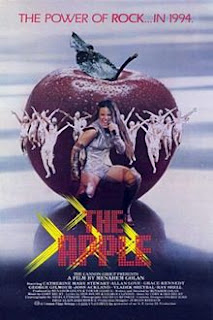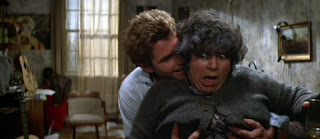Israeli film enthusiasts Menahem Golan and Yoram Globus came along in the late '70's and took over Cannon Films, turning it into a sometimes profitable schlock machine that cranked out some of the best-worst movies of the era. Their library is made-up of films that could all have a Hal Douglas voiceover in their trailer: Death Wish II (1982), The Last American Virgin (1982), Bolero (1984), Missing in Action (1984), Invasion U.S.A. (1983).
The cheapness of their prodigious output was tolerated by audiences because of the levels of sex and gore that were forced into every screenplay. But eternal optimists, Golan and Globus always worked, wheedled, and pitched their next film in the hopes that it would be the one that would get them taken seriously. The documentary is a lot of fun as former stars, directors, and co-producers chart the rise and the fall of the Dynamic Duo of Duds- who may not have had any taste, but they sure had chutzpah.
Here are my Top 5 Cannon Films and while it's hard to say any of these are good, I can say they leave an impression.
The Apple (1980)
One of the Go-Go Boys' first films after they acquired Cannon, is this attempt to make the next Tommy (1975). What they made looks more like a Eurovision song contest on PCP. It is 1994, and two kids from the sticks, Bibi and Alphie (Catherine Mary Stewart and George Gilmour disrespectively), come to the big city to compete in a worldwide singing competition and get sucked into the dark underworld of sex, drugs, and euro-pop. Will their love be able to overcome lies, betrayal, and bad rock?
Everything in the movie is too-much- and at the same time not enough. Costumes, story, acting, songs, singing, dancing- all are done with obnoxious seriousness, without enough cash to make West Berlin look like futuristic America.
The movie is trying so hard to be a Biblical metaphor that critiques how the music industry grinds up people set in a futuristic society . It really is trying. See how hard it is trying. But it totally misses the mark, leaving us with a movie that causes one's jaw to drop- and not in the good way.
Look for character actress extraordinaire Miriam Margolyes as the Landlady... because they couldn't afford to give the landlady character an actual name...
Breakin' (1984)
I'm a white boy from Kansas. And when Breakin' came out in '84 the whole neighborhood lost its ever-lovin' mind. The dance moves, the music... the black people! Soon we were all wearing parachute pants from JC Penneys, making wiggy-wiggy-wiggy noises, throwing cardboard down on our yards, and trying our hardest to do headspins, moonwalk, and pop-and-lock. That, ladies and gentlemen was the power of Breakin'.
Seven months later when Cannon made a sequel with the much maligned Electric Boogaloo in the title, the dance craze had lost its appeal- and mainstream hip-hop had moved on to more realistic grit and anger. But there was a golden time in that Summer of '84 when we all tried to be like Shabba-Doo and Boogaloo Shrimp.
Invaders from Mars (1986)
When I first saw the trailer for Tobe Hooper's re-make of the '50s classic Invaders from Mars, my 14 year-old-brain was freaked out. I mean when you have the director of The Texas Chainsaw Massacre (1974); Dan O'Bannon, the writer of Alien (1979); and special-effects master Stan Winston working together, you should get some major scare-age. Throw in Karen Black, Louise Fletcher, Timothy Bottoms, Laraine Newman, and Bud Court, and you have a slam-dunk sci-fi horror movie. Well...
The movie's plot is a version of the typical Fifties horror film: young boy sees alien ship land in backyard, no one believes young boy's story, people begin behaving strangely, young boy has to figure out how to save his town and perhaps the world from an unseen alien threat. The themes of paranoia and a mistrust of those you think you know and love were apropos for the era of the Red Scare- and Reagan's '80's Cold War with Russia conjured up some of the same fears. In that way, the film is really creepy in how it makes us question the veracity of what we think we know by turning parents and teachers into threats to the truth.
What doesn't work in this film is the reveal of the alien threat. The special effects of the ghostly lit backyard and a spinning sandtrap that drags victims under are great in that the aliens are left to our imaginations. But once the alien drones are revealed, we laugh more than we scream. Hooper struggled with the low budget he was given and Winston actually only created two of the hobbling, toothy Audrey 2-esque alien monsters. So camera tricks had to be employed to make the impression that this was a terrifying invasion force.
Hooper was furious at being low-balled on his budget by the G-Boys, and Golan and Globus felt that they had been horn-swaggled by a supposed horror master. The result was yet another Cannon box office disappointment. But hey! I'll watch Louise Fletcher eat a lab frog anyday.
Tough Guys Don't Dance (1987)
There are a lot of movies that people label the "Worst Movie of All-Time". Personally, anything with Adam Sandler in it is in the running. But Tough Guys might actually be the crown-holder of the dubious distinction of worst movie ever. Golan and Globus were desperate to gain recognition as serious film producers, so in the mid-Eighties they used what capital they had to lure celebrated talent to their projects. Franco Zefferelli, John Cassavetes, and even French film auteur Jean-Luc Godard took the bait and worked with Cannon with less than stellar results. Authorial icon Norman Mailer wished to direct the film version of his noir-influenced 1984 novel and Cannon coughed-up the cash for him to do it. Mailer had only directed a handful of films in his career, but with the help of legendary Chinatown (1974) screenwriter Robert Towne, he hoped to create something notable. It's notable alright.
Tim Madden (Ryan O'Neal) is a blackout drunk who wakes up in a bloody car and finds a severed head in his marijuana stash. Madden begins flashing back over his lushy life to try and figure out who the head belongs to and who has committed this heinous act. His dying father (Lawrence Tierney) and his girlfriend (Isabella Rossellini slumming it) figure prominently in his soap opera-worthy musings, but the twists and turns of this mystery are as murky as Madden's memory.
A trailer for the film suggests that Cannon realized fairly quickly that this film was not going to be received seriously, so they attempted to take the campy route in its promotion. It still didn't work. The film bombed and became a cult favorite for its over-acting; lines like,"Cause you don't have a womb!"; and the famous Oh Man, Oh God! scene. Mailer would never direct again, and perhaps that was for the best.
Barfly (1987)
1987 also produced what was supposed to be another prestige project starring Mickey Rourke and Faye Dunaway as- well, as barflies. With a semi-autobiographical screenplay by poet and novelist Charles Bukowski, Barfly was meant to be a raw and edgy look at the wasted lives of wasted people. Mission accomplished.
Rourke is Henry Chinaski, a poet stuck in a bottle who goes from odd job to bar to rathole, opining about life in between barfights and blackouts. Along the way he meets Wanda (Dunaway), a kept woman who enjoys spending her lover's money on hooch and other men. Henry and Wanda are soon drinking and sleeping together- a co-dependent, enabling match made in Finlandia.
The film is a total downer. But the performances by Rourke and Dunaway are raw, complicated, and disturbing. Rourke was still hot from his sexy success in 9 1/2 Weeks (1986), but shades of the messed-up performance he would later earn an Oscar nom for in The Wrestler (2008) are evident. Dunaway's post Mommie Dearest (1981) career-slide was not stopped by Barfly- although she was nominated for a Golden Globe for Best Actress. The film is ultimately a dark character piece that reeks of the apathy of alcoholism without the intervention it so desperately needs.
By the end of 1987 Cannon Films received what was probably their deathblow. They had
poured a lot of money (for them) into Superman IV: The Quest for Peace and Masters of the Universe. But both movies tanked- in large part because their special effects looked so cheap. Their reliably lucrative franchises Death Wish and Missing in Action both produced sequels that likewise bombed.
Golan and Globus held on another nine years, but were never able to make the film that would gain the acclaim or the box office they sought. But their passion to keep cranking out movies in the hopes of creating something special resulted in a body of work that stands out for its cult appeal- if not its cinematic excellence.























No comments:
Post a Comment